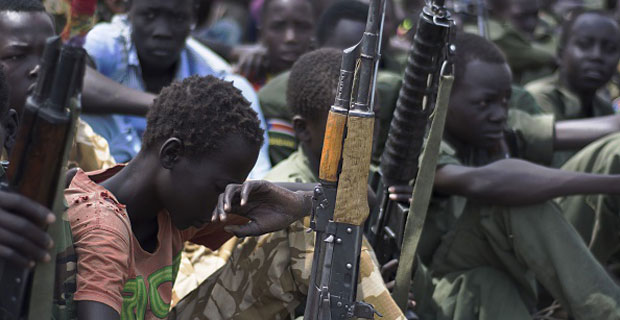South Sudan: government and rebels 'recruiting child soldiers'
Human Rights Watch accuses both sides in South Sudan's conflict of arming young children – often by force

A free daily email with the biggest news stories of the day – and the best features from TheWeek.com
You are now subscribed
Your newsletter sign-up was successful
Government and rebel forces in South Sudan stand accused of recruiting and using child soldiers in combat, despite renewed promises from both sides.
Human Rights Watch says that children as young as 13 are being given weapons and little or no training before being forced into conflict.
In some towns, soldiers are forcibly abducting children from their homes."In Malakal, government forces are even taking children from right outside the United Nations compound," said the organisation's Africa director Daniel Bekele.
The Week
Escape your echo chamber. Get the facts behind the news, plus analysis from multiple perspectives.

Sign up for The Week's Free Newsletters
From our morning news briefing to a weekly Good News Newsletter, get the best of The Week delivered directly to your inbox.
From our morning news briefing to a weekly Good News Newsletter, get the best of The Week delivered directly to your inbox.
The report has been dismissed by government officials, who say they have no need to recruit underage fighters. "How can we recruit child soldiers at a time when we have sufficient manpower?" said Minister for Information Michael Makuei."We have no child soldiers."
In Sudan it is illegal for anyone under the age of 18 to join the army, and the use of children under the age of 15 is considered a war crime under international law.
Despite this, more than 12,000 children, the majority of them boys, have been recruited and used as soldiers by the army and various militia in the last year alone, reports Al Jazeera. Since January, Unicef says it has negotiated the release of 300 child soldiers from one rebel group, but many more are still fighting.
The conflict in South Sudan began in 2013 when President Salva Kiir's forces clashed with rebel soldiers loyal to the ousted vice president Riek Machar. What began as a political power struggle soon divided along ethnic lines, with the Dinka and the Nuer communities effectively at war.
A free daily email with the biggest news stories of the day – and the best features from TheWeek.com
"South Sudanese children's lives are being devastated by conflict, with children once again going to war instead of to school," Bekele said. "Both sides should stop recruiting children, and hold those responsible to account."
-
 What are the best investments for beginners?
What are the best investments for beginners?The Explainer Stocks and ETFs and bonds, oh my
-
 What to know before filing your own taxes for the first time
What to know before filing your own taxes for the first timethe explainer Tackle this financial milestone with confidence
-
 The biggest box office flops of the 21st century
The biggest box office flops of the 21st centuryin depth Unnecessary remakes and turgid, expensive CGI-fests highlight this list of these most notorious box-office losers
-
 Epstein files topple law CEO, roil UK government
Epstein files topple law CEO, roil UK governmentSpeed Read Peter Mandelson, Britain’s former ambassador to the US, is caught up in the scandal
-
 Iran and US prepare to meet after skirmishes
Iran and US prepare to meet after skirmishesSpeed Read The incident comes amid heightened tensions in the Middle East
-
 Israel retrieves final hostage’s body from Gaza
Israel retrieves final hostage’s body from GazaSpeed Read The 24-year-old police officer was killed during the initial Hamas attack
-
 China’s Xi targets top general in growing purge
China’s Xi targets top general in growing purgeSpeed Read Zhang Youxia is being investigated over ‘grave violations’ of the law
-
 Panama and Canada are negotiating over a crucial copper mine
Panama and Canada are negotiating over a crucial copper mineIn the Spotlight Panama is set to make a final decision on the mine this summer
-
 Why Greenland’s natural resources are nearly impossible to mine
Why Greenland’s natural resources are nearly impossible to mineThe Explainer The country’s natural landscape makes the task extremely difficult
-
 Trump, Iran trade threats as protest deaths rise
Trump, Iran trade threats as protest deaths riseSpeed Read The death toll in Iran has surpassed 500
-
 Iran cuts internet as protests escalate
Iran cuts internet as protests escalateSpeed Reada Government buildings across the country have been set on fire